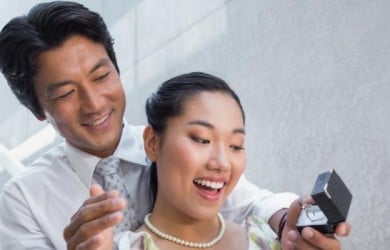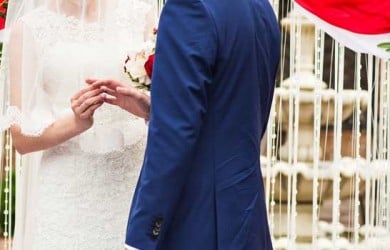Traditional Buddhist Wedding Vows to Inspire Your Own

Heal & Grow Daily 30-Sec Tips for a Happier Relationship
👉 Subscribe FREEKey Takeaways
Marriage.com AI Quick Summary
Buddhists believe that they are walking a path of transformation of their inner potential, and through serving others they can help them also to awaken their own inner potential.
Marriage is the perfect setting to practice and demonstrate this attitude of service and transformation.
When a Buddhist couple decides to take the step of marriage, they make a pledge to a greater truth based on the Buddhist scriptures.
Buddhism allows each couple to decide for themselves regarding their wedding vows and the issues pertaining to marriage.
Exchanging of Buddhist vows
The traditional Buddhist wedding vows or Buddhist wedding readings are similar to Catholic wedding vows in that the exchanging of the vows forms the heart or the essential element of the institution of marriage in which each spouse willingly gives himself or herself to the other.
The Buddhist marriage vows may be spoken in unison or read silently in front of a shrine consisting of a Buddha image, candles and flowers.
An example of vows spoken by the bride and groom to each other maybe something similar to the following:
“Today we promise to dedicate ourselves completely to each other with body, mind, and speech. In every situation of this life, in wealth or poverty, in health or sickness, in happiness or difficulty, we will work to help each other to develop our hearts and minds, cultivating compassion, generosity, ethics, patience, enthusiasm, concentration and wisdom. As we undergo the various ups and downs of life we will seek to transform them into the path of love, compassion, joy, and equanimity. The purpose of our relationship will be to attain enlightenment by perfecting our kindness and compassion towards all beings.”
Buddhist marriage readings
After the vows, there may be certain Buddhist marriage readings such as those found in the Sigalovada Sutta. Buddhist readings for weddings can be recited or chanted.
This would be followed by the exchanging of rings as the outward sign of an inner spiritual bonding which unites two hearts in the partnership of marriage.
The Buddhist marriage ceremony provides a space for the newlyweds to meditate on transferring their beliefs and principles into their marriage as they continue together on the path of transformation.
Buddhist wedding ceremony
Rather than prioritizing religious practices, Buddhist wedding traditions deeply emphasize on the fulfillment of their spiritual wedding vows.
Seeing that marriage in Buddhism is not considered as the path to salvation there are no strict guidelines or Buddhist wedding ceremony scriptures.
There are no specific Buddhist wedding vows examples as Buddhism takes into consideration the personal choices and preferences of the couple.
Be it Buddhist wedding vows or any other wedding ceremony, the families have complete freedom to decide the type of wedding they want to have.
Buddhist wedding rituals
Like many other traditional weddings, Buddhist weddings also constitute both pre and post-wedding rituals.
In the first pre-wedding ritual, a member of the groom’s family visits the family of the girl and offers them a bottle of wine and a wife scarf also known as the ‘Khada’.
If the girl’s family is open to the marriage they accept the gifts. Once this formal visit is finished the families initiate the process of horoscope matching. This formal visit is also known as the ‘Khachang’.
The horoscope matching process is where the parents or family of the bride or groom search for an ideal partner. After comparing and matching the horoscopes of the boy and the girl the wedding preparations are progressed.
Next comes the Nangchang or Chessian which refers to the formal engagement of the bride and the groom. The ceremony is conducted under the presence of a monk, during which the maternal uncle of the bride sits along with a Rinpoche on a raised platform.
The Rinpoche recites religious mantras while the family members are served a religious drink called Madyan as a token for the couple’s health.
The relatives bring different kinds of meats as gifts, and the mother of the bride is gifted rice and chicken as a form of appreciation for raising her daughter.
On the day of the wedding, the couple visits the temple early in the morning along with their families, and the groom’s family brings along many forms of gifts for the bride and her family.
The couple and their families assemble in front of the shrine of the Buddha and recite the traditional Buddhist marriage vows.
After the wedding ceremony is over the couple and their families move to more non-religious environment and enjoy a feast, and exchange presents or gifts.
After consulting the kikas, the couple leaves the paternal home of the bride and goes to the paternal home of the groom.
The couple can even choose to stay separate from the groom’s family if they want. The post-wedding rituals associated with a Buddhist marriage are more like any other religion and usually include feasts and dancing.
 Tips
Tips
Write your tip or submit a video tip
All tips are reviewed before the publishing.
Share this article on
Want to have a happier, healthier marriage?
If you feel disconnected or frustrated about the state of your marriage but want to avoid separation and/or divorce, the marriage.com course meant for married couples is an excellent resource to help you overcome the most challenging aspects of being married.
Recent Articles
Related Quizzes
Heal & Grow Daily 30-Sec Tips for a Happier, Healthier Relationship
👉 Subscribe FREE on YouTube We'd love your feedback!
We'd love your feedback!
 Expert Q&A
Expert Q&A
Ask your question related to this topic & get the support you deserve from experts.



















 Thanks for your feedback!
Thanks for your feedback!